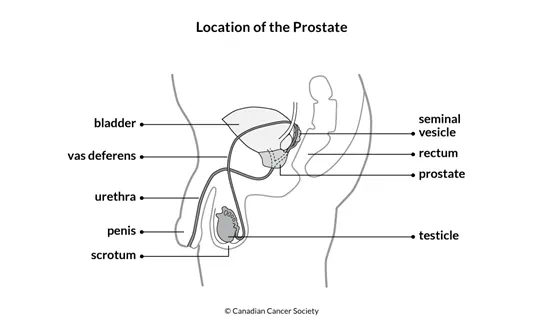The prostate
The prostate (or prostate gland) is part of the male reproductive and urinary systems. It is about the size of a walnut in younger men, but it may start to get larger when men reach their late 40s and early 50s.
The prostate is deep inside the pelvis, below the bladder and in front of the rectum. It wraps around the upper part of the urethra (called the prostatic urethra). The urethra is a tube that carries urine (pee) from the bladder, through the prostate and penis, and out of the body.
The prostate is close to parts of the digestive, urinary and reproductive systems. As a result, prostate cancer and its treatments can affect these systems. For example, an enlarged prostate can press on and block the urethra, which can cause problems urinating. Radiation therapy for prostate cancer can affect the rectum and cause bowel problems. Surgery to remove prostate cancer can affect nerves that are connected to the bladder and penis, which can affect urinary and sexual function.

Structure
The upper part of the prostate is called the base. It rests against the lower part (neck) of the bladder. The lower, narrowed part of the prostate is called the apex. The prostate is divided into a right lobe and a left lobe.
The prostate is made up of many branching ducts surrounded by the stroma. The stroma is made up of connective tissue and muscle fibres. The cells that line the ducts make prostatic fluid, which is mixed with sperm and other fluid to make semen. Most of the prostate is covered by a thin layer of connective tissue called the capsule. The apex of the prostate is covered by the anterior fibromuscular stroma, which is made up of muscle fibres and connective tissue.
The seminal vesicles are glands found on each side of the prostate. They make most of the fluid in semen. The seminal vesicles are sometimes removed during surgery to remove the prostate (called a radical prostatectomy).
Function
The main function of the prostate is to make prostatic fluid. Prostatic fluid is rich in enzymes, proteins and minerals that help protect and nourish sperm. When a man is sexually aroused, the prostate pushes prostatic fluid through the ducts and into the urethra. Prostatic fluid mixes with sperm and other fluids in the urethra and is ejaculated as semen.
Hormones, including testosterone and those made by the pituitary gland and adrenal glands, help control the function of the prostate gland.
Your trusted source for accurate cancer information
With support from readers like you, we can continue to provide the highest quality cancer information for over 100 types of cancer.
We’re here to ensure easy access to accurate cancer information for you and the millions of people who visit this website every year. But we can’t do it alone.
Every donation helps fund reliable cancer information, compassionate support services and the most promising research. Please give today because every contribution counts. Thank you.
